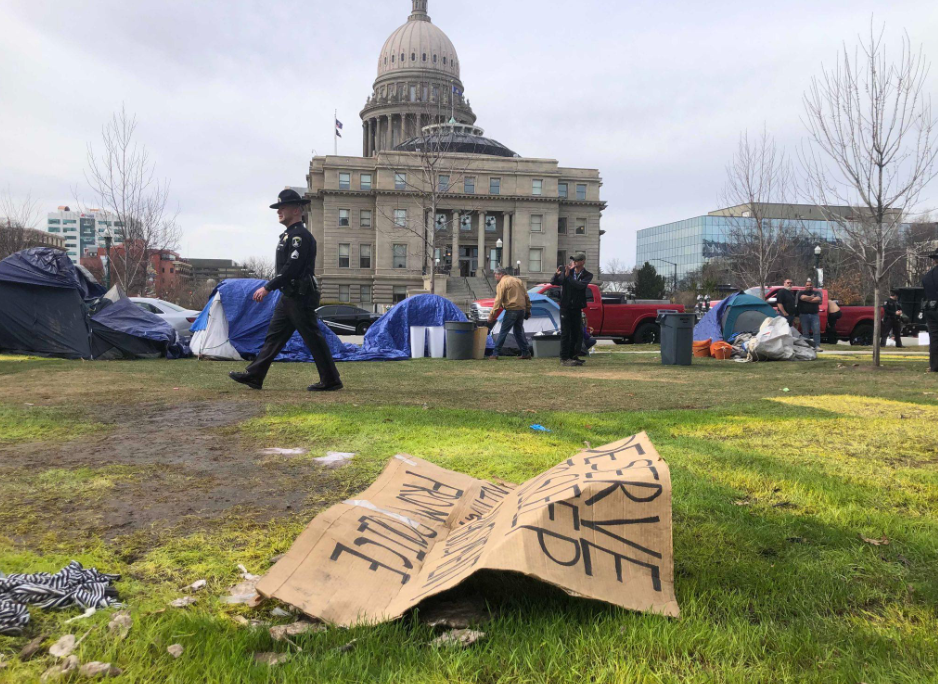Report from Boise, Idaho on State repression against ongoing protests at the state capitol to demand access to housing and an end to police harassment.
The ongoing 24/7 protest in so-called Boise enters its 10th week. Folks have persisted with their messaging through ongoing state harassment and repression, harassment by local fascist groups, and daunting weather conditions. The collectively constructed demands remain the same:
On Tuesday, March 15, 2022 the state of so-called Idaho filed a civil lawsuit against folks at the protest, and local supporters, Boise Mutual Aid, in efforts to deconstruct and tear down the protest. The lawsuit claims that the protest is a public health hazard, a criminal hide out space (though an area with 24/7 surveillance, right across from the state capitol and constant Idaho state police harassment, does not a safe house make), and haven to criminal activity. The suit claims that people are defecating and urinating on the statehouse grounds, though earlier attempts at setting up sanitary bathrooms on the grounds were torn down by the state, who claimed that restrooms are not allowed in the space.
Belodoff served as the lead attorney in the Martin v. City of Boise case in 2019. The case struck down a similar camping ban on the city level due to a violation of the 8th amendment.https://t.co/uIqSqelixV
— Andrew Baertlein (@AndrewBaertlein) March 22, 2022
On Friday, March 19th, 2022 a bunch of cops and state workers went to the protest with a privately hired hazmat crew. This was a theatrical stunt to make the larger community believe the protest is a public health hazard. The hazmat crew threw away tents filled with protester’s private property, including their tents. They left only 6 tents standing and threw away an insurmountable amount of property, tents, and gear. Local officials and those involved in suing the protest walked around the area doing interviews with local news sources with no biohazard gear on (which they would be likely wearing if the area was indeed a bio hazard threat). State officials stood in the space reflecting on the health of the grass while their hazmat crew walked around stealing protester’s private property and throwing it into a dump truck.
The lawsuit repeatedly touts that the protest is depreciating the grandeur of the State, as it is across the street from the Idaho Capitol Building. The State, since the beginning of the protest, has ignored the stated needs of people on the streets and repeatedly spent money and resources on maintaining the health of the grass, in the dead of winter. It is all too clear what the state’s priority is, and it’s not community member’s lives and well-being.
In this frigid winter, the mistreatment of Boise’s thousands of unhoused people has only intensified. Housing remains scarce and unaffordable, while overcrowding and restrictions in shelters have kept many on the street.https://t.co/6StJgWMHkb
— Truthout (@truthout) March 17, 2022
Meanwhile, local media has been covering the perspective of protesters at an increasing rate (relative to past reporting, that mainly reported the words and perspectives of state officials and law enforcement). A noticeable and alarming trend has been the arresting of folks that are speaking out on interviews, many are still held because of a lack of funds to continue getting everyone out with legal support efforts.

The potential implications of the lawsuit are far reaching. Repression of folks standing up against oppressive state tactics and criminalization of folks experiencing poverty is chilling. However, the State has taken it even a step further from that atrocity, with attempts at repression and intimidation of mutual aid groups that are providing and modeling support and collaborative care. The state named one of Boise Mutual Aid’s collective members in the lawsuit, and a drone was seen following another collective member to their house (in what is an assumed attempt at intimidation).
Over a dozen mutual aid volunteers in #Asheville have received felonies + stay away orders from parks, after activists were arrested last Christmas for providing direct aid in protest of the city evicting people during the pandemic. Via @ursulawren https://t.co/hLJ6X7aO3U
— It's Going Down (@IGD_News) March 23, 2022
Another mutual aid group, in so-called Asheville, North Carolina, is being targeted, and ticketed with felonies for “littering,” for standing in solidarity with folks who are experiencing houselessness. What does the world look like if the State is able to continue to criminalize poverty? What does the world look like if the State continues to shut out large sectors of our communities from access to resources – and – silence the voices drawing attention to that violence? What does the world look like if our species’ survival response of sharing resources and community support of each other is criminalized? Let’s not wait and find out, now is a crucial time to come together and stand in solidarity against the repression of resistance to systemic oppression, the criminalization of poverty, and the criminalization of collaborative care.
by Anonymous Contributor via It's Going Down

No comments:
Post a Comment